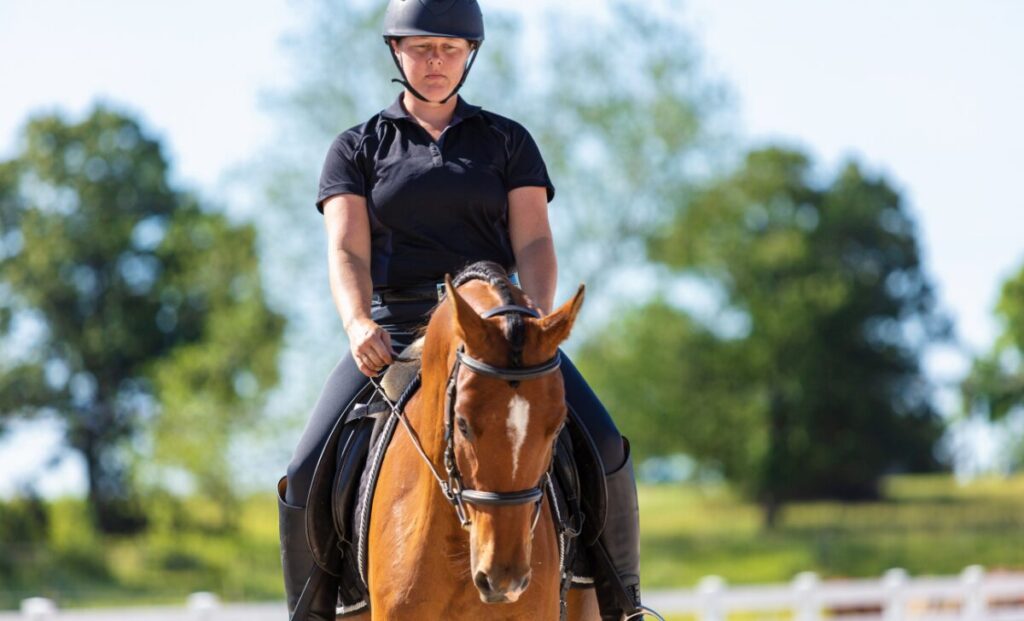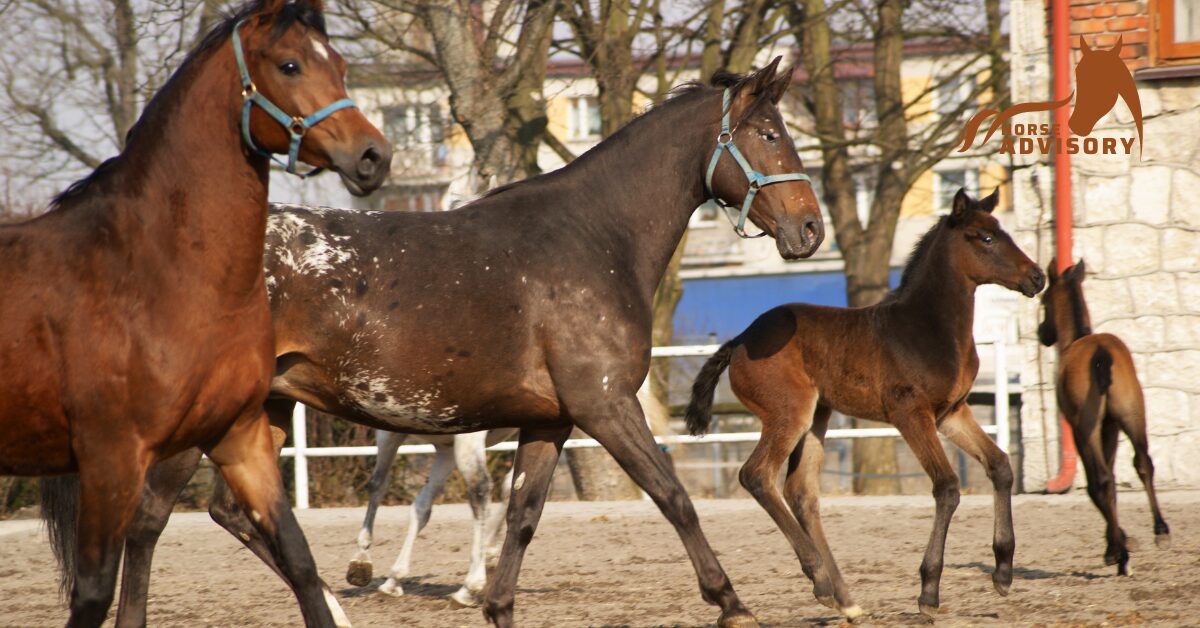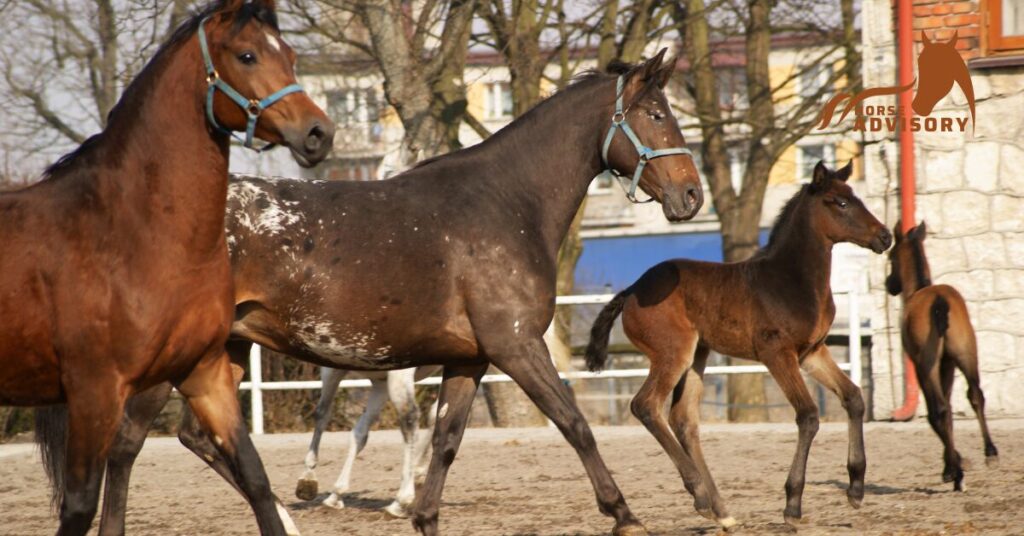The Arabian horse, with its distinct beauty, intelligence, and historical significance, holds a special place in the hearts of equine enthusiasts. Training and socializing young Arabian horses is a rewarding experience that requires a delicate balance of patience, understanding, and consistency. In this blog post, we’ll explore the best practices for starting their training, the importance of early socialization, and effective techniques to build trust and confidence.
Best Practices for Training Young Arabian Horses
Starting the training of young Arabian horses requires a gentle approach, given their sensitive and intelligent nature. Here are some key practices to consider:
1. Start Slow with Groundwork
Groundwork forms the cornerstone of any successful training regimen for young Arabian horses. Starting with basic commands and manners on the ground helps establish trust and communication between the horse and handler.
Beginning with groundwork ensures that the horse becomes comfortable with human interaction and learns essential cues in a non-threatening manner. This stage lays the foundation for more advanced training by fostering a calm and cooperative demeanor.
Implementation Tips:
- Leading and Haltering: Practice leading the horse with a halter in a controlled environment. Use gentle pressure and release techniques to guide the horse.
- Voice Cues: Introduce simple commands like “walk,” “stop,” and “back” to familiarize the horse with verbal communication.
- Desensitization: Expose the horse to different stimuli, such as grooming tools and tarps, to build their confidence and reduce fearfulness.
Young horses may be skittish and easily distracted. Patience is crucial, as each horse will progress at its own pace. Celebrate small victories to encourage ongoing development.

2. Positive Reinforcement
Utilizing positive reinforcement taps into the Arabian horse’s intelligence and eagerness to learn, making training sessions both effective and enjoyable.
Positive reinforcement encourages horses to repeat desired behaviors by associating them with rewards, such as treats or praise. This method builds a trusting relationship and enhances the horse’s willingness to cooperate.
Implementation Tips:
- Immediate Rewards: Provide a treat or verbal praise immediately after the horse performs the desired behavior to reinforce the connection.
- Consistency in Rewards: Use the same type of reward for specific behaviors to avoid confusing the horse.
- Gradual Progression: Start with simple tasks and gradually increase complexity as the horse demonstrates understanding and enthusiasm.
Over-reliance on treats can lead to a horse becoming treat-focused rather than task-focused. Balance treats with praise to maintain attention on the training itself.
3. Consistency is Key
Establishing a routine helps young Arabians feel secure and understand expectations, leading to a more confident and responsive horse.
Consistency in commands, training times, and environments provides structure, reducing anxiety and fostering a sense of predictability for the horse.
Implementation Tips:
- Routine Training Schedule: Conduct training sessions at the same time each day to create a sense of familiarity.
- Uniform Commands: Use the same words and gestures for each command to prevent confusion.
- Stable Environment: Minimize changes in the training environment to keep the horse focused on learning rather than adjusting to new surroundings.
Life’s unpredictability can sometimes disrupt routines. Be flexible and patient, and resume the established routine as soon as possible.
4. Short Sessions
Young Arabians benefit from brief training sessions that match their attention span and keep them engaged without causing burnout.
Short sessions prevent fatigue and frustration, maintaining the horse’s willingness to learn and participate. This method respects the young horse’s physical and mental limits.
Implementation Tips:
- 15-20 Minute Sessions: Limit training to manageable durations, ensuring each session ends on a positive note.
- Breaks for Bonding: Incorporate breaks for grooming or hand-grazing to strengthen the bond and provide mental rest.
- Vary Activities: Change the focus of each session to keep training interesting and challenging, preventing monotony.
It can be tempting to extend sessions when progress is evident, but overworking a young horse can lead to resistance and stress. Prioritize the horse’s long-term development over short-term gains.
Importance of Early Socialization for Young Arabian Horses
Early socialization is crucial for young Arabian horses to develop into well-adjusted adults. It involves introducing them to various environments, people, and other animals. Here’s why it’s essential:
Reduces Anxiety
Young Arabian horses, like many animals, are naturally cautious of new or unfamiliar situations. Early socialization plays a pivotal role in reducing anxiety by gradually acclimating them to different stimuli. By exposing young horses to a variety of sights, sounds, and experiences, they learn to navigate the world with less fear and more curiosity. This exposure helps their nervous systems adapt to change, making them more resilient. For instance, introducing them to different terrains, grooming sessions, and routine veterinary care at a young age can make these experiences less intimidating over time.
Moreover, reducing anxiety through socialization contributes to a horse’s overall well-being. A less anxious horse tends to exhibit fewer stress-related behaviors, such as biting or bolting, which in turn makes handling and training them safer and more enjoyable.
Trainers can facilitate this process by introducing new experiences gradually and in a controlled manner, ensuring the horse feels secure. However, it is important to monitor the horse’s reactions closely to avoid overwhelming them, as pushing too hard can have the opposite effect and increase anxiety.
Builds Trust
Trust is the cornerstone of any successful relationship between a horse and a handler, and early socialization is key to building this trust. Regular interaction with humans as well as other horses helps young Arabians learn that people can be sources of positive experiences, such as grooming, feeding, and playtime. This positive association is crucial for developing a cooperative and willing partnership. Horses that trust their handlers are more likely to respond calmly to commands and less likely to react negatively in new situations.
In addition to fostering trust with humans, socialization with other horses teaches valuable lessons in herd dynamics and social behavior. Young Arabians learn to read body language, understand social cues, and establish their place within a group.
This social learning is essential for their emotional development and can prevent behavioral issues that stem from isolation. Trainers should facilitate these interactions in safe environments and under supervision to ensure positive experiences while watching out for potential conflicts that might arise within a herd setting.
Enhances Communication
Effective communication is essential for establishing a harmonious relationship between handlers and young Arabian horses. Socialization enhances a horse’s ability to communicate by exposing them to a variety of social cues from humans and other horses.
Through early socialization, horses learn to recognize and respond to human gestures, voice commands, and body language, which are integral to training and daily interactions. This understanding leads to more precise and effective communication, reducing the likelihood of misunderstandings that could result in stress or conflict.
Furthermore, as social animals, horses rely on their ability to communicate with one another to maintain social order and express needs or discomforts. Early interactions with other horses help young Arabians develop a nuanced understanding of equine communication, which is critical for their social integration and mental health.
Trainers can enhance communication skills by providing opportunities for young horses to interact in diverse settings, allowing them to observe and mimic behaviors. However, it is important to ensure these interactions are positive and that any aggressive behaviors are addressed promptly to prevent negative habits from forming.
Techniques to Build Trust and Confidence
Building trust and confidence in young Arabian horses requires a thoughtful, patient approach, emphasizing their unique sensitivity and intelligence. Here’s an expanded look at some key techniques:
- Gentle Handling: Gentle handling forms the foundation of trust-building with Arabian horses. These horses are known for their alertness and sensitivity, making it crucial to approach them with calmness and soothing tones. For example, when leading an Arabian colt, use a soft halter and avoid sudden movements, which can startle them. The benefits of gentle handling include a stronger bond between horse and handler and reduced anxiety in the horse. A potential challenge is ensuring that gentleness doesn’t turn into permissiveness; it’s important to maintain clear boundaries to prevent undesirable behaviors.
- Routine Exposure: Gradually introducing young Arabian horses to various stimuli is key to building their confidence. Starting with simple exercises, such as walking them through a quiet area before gradually increasing the complexity with busier environments, helps desensitize them to new experiences. For example, introduce a tarp on the ground for them to walk over, gradually increasing to more challenging scenarios like crossing water. The advantage here is a well-rounded horse that’s less likely to spook in unfamiliar situations. However, it’s important to monitor the horse’s stress levels to avoid overwhelming them, which could set back their progress.
- Patient Training: Patience is essential when training young Arabians, as these horses can be inquisitive yet easily frightened. Allowing them to investigate new objects like a plastic bag or a ball at their own pace builds trust and encourages curiosity. For instance, if a young horse hesitates to approach a new object, stand by it calmly, allowing the horse to approach in its own time. The primary benefit of this method is fostering a sense of security and autonomy in the horse, leading to increased confidence in novel situations. The challenge lies in resisting the urge to push the horse too quickly, which can lead to setbacks in their development.
Unique Characteristics of Arabian Horses
Arabian horses are renowned for their distinct characteristics that shape their training and socialization experiences. Here’s an expanded look at how these traits influence their development:
Intelligence
Arabian horses are exceptionally intelligent, which allows them to learn quickly and adapt to new situations. This intelligence can be a double-edged sword; while they pick up on training commands rapidly, they can also become bored or frustrated with monotonous routines. To keep them engaged, it’s essential to introduce varied and mentally stimulating exercises.
For example, integrating obstacle courses or problem-solving tasks during training sessions can keep their minds active and prevent boredom. The benefit of this intelligence is a highly trainable horse that excels in complex tasks. However, trainers must be creative and attentive to maintain the horse’s interest and prevent disruptive behaviors that can arise from boredom.
Sensitivity
Arabians are highly sensitive to their environment and the emotions of those around them. This sensitivity makes them incredibly responsive to their handler’s body language and emotional state. When working with Arabians, maintaining a calm and composed demeanor is crucial, as any tension or anxiety can be quickly picked up by the horse, potentially leading to stress or mistrust. A benefit of this sensitivity is that when a strong, trusting bond is formed, Arabians can become incredibly loyal and connected to their handlers.
The challenge lies in ensuring that interactions are consistently positive and that handlers are self-aware of their own emotions to prevent negative influences on the horse’s behavior.
Stamina and Endurance
Arabian horses are world-famous for their remarkable stamina and endurance, traits that make them ideal for endurance riding and other physically demanding activities. This natural ability allows them to perform well in long-distance events and competitive disciplines, such as endurance racing and trail riding.
The benefit of this endurance is that Arabians can maintain high energy levels over extended periods, making them versatile athletes. However, their high energy levels require regular, structured exercise to prevent restlessness or the development of bad habits. It’s important for handlers to balance physical challenges with adequate rest and recovery to keep the horse in optimal condition.
Handling Common Challenges
Training and socializing young Arabian horses can present challenges. Here are some tips to handle them:
- Managing Nervousness: If a horse becomes nervous, step back, allow them some time, and gradually reintroduce the stimulus. Patience is vital.
- Dealing with Stubbornness: Use clear and consistent cues to overcome any reluctance. Avoid harsh corrections as they can damage the trust relationship.
- Addressing Distractions: Train in a quiet environment initially and gradually introduce distractions to improve focus.
Conclusion
Training and socializing young Arabian horses is an art that blends knowledge with empathy. By understanding their unique traits and focusing on building trust and confidence, you can nurture a well-rounded horse capable of forming strong bonds with humans. Whether you’re a seasoned trainer or a new enthusiast, the journey with these magnificent creatures offers endless learning and joy, ensuring that the legacy of the Arabian horse continues to shine brightly in the equine world.





